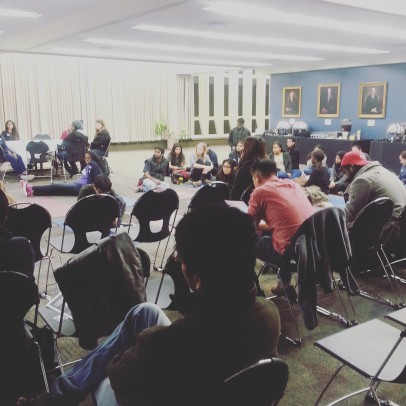Hunger banquet puts food disparity on the table

Students are separated into income groups during the OxFam America Hunger Banquet. The low-income group sat on yoga mats on the floor.
After they stepped off the third-floor elevators in Student Center East, students blindly grabbed a slip of paper.
When they turned it over, they learned if they were among the low-, middle- or high-income group and received the biography of the person they would become at the OxFam America Hunger Banquet.
The Nov. 19 event, sponsored by the Student Activities Board, engaged students through activities and discussion on the unequal distribution of resources and poverty.
Student Activities Board member Anne Fan painted a picture of the world.
“Only about 30 percent of people can afford a nutritious healthy diet,” Fan said. “The majority, however, earn $2.83 per day and can barely afford necessities, traveling 5 to 10 miles for water and tilling fields for food. Education is inaccessible.”
After an introduction on the disparity of resources around the world, students from different income groups volunteered to reenact real-life scenarios. Scenarios included a family of fishermen from Bangladesh who lost their livelihood in a cyclone and a young man from a wealthy Cape Town suburb who wanted to explore life before going to college. Volunteers who played the fishermen quickly slipped to the low-income area, while the Cape Town man was untouched by any of his decisions.
The event ended with food and reflection. The lower-income groups received a portion of rice and beans on plastic plates. One table over, the upper class ate pasta and salad from ceramic plates.
Nirali Patel felt uncomfortable eating her lavish meal near others who were rationed beans and rice.
“I wish there was a way we could share food,” said Patel, a senior in biochemistry. “I couldn’t do anything about it and I didn’t even earn my status.”
History professor Susan Levine spoke about how people could eliminate disparities and the hunger crisis by reallocating resources to those who don’t have access.
“Think of yourself as some who can lead and impact the world,” said Levine, director of the Institute for the Humanities.
